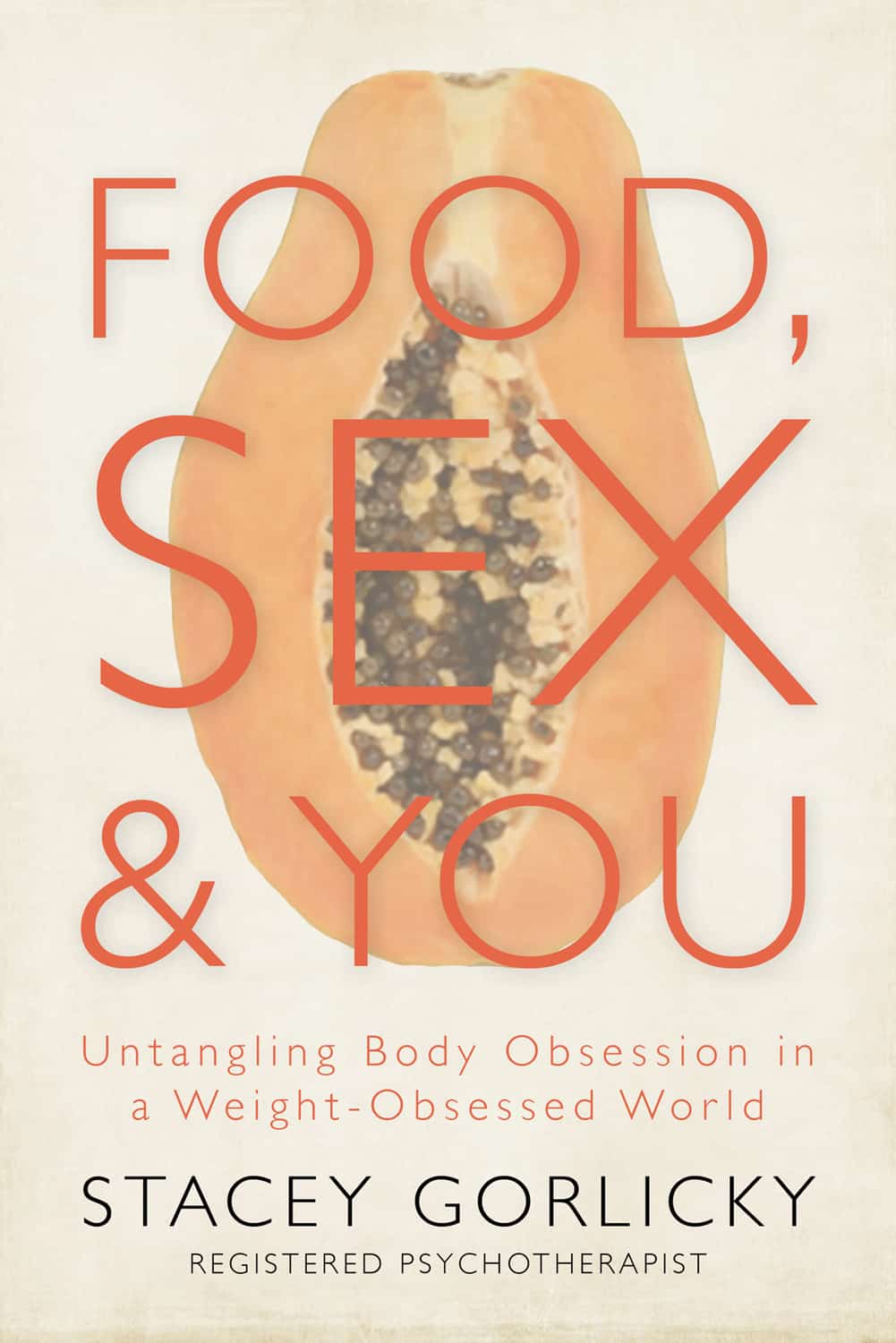Food & sex are extremely powerful forces that have the potential to dominate our lives.
In her new book, Food, Sex & You: Untangling Body Obsession in a Weight-Obsessed World, psychotherapist Stacey Gorlicky examines the delicate correlation between the need for food and the desire for sex. She documents her own battle, and those of her clients, in overcoming obsessions and fears around these two evolutionary drives.
The book guides readers through a road to recovery from distorted body image and self-dissatisfaction, addressing the challenges that occur when food and sex are used to feed psychological voids and wounds. We chatted with Stacey about her book last week.
SDTC: Why are food and sex so interchangeable in our culture?
SG: Food like sex are two of life’s greatest pleasures. We definitely cannot survive without food, and sex is – and has been – a pleasure for our bodies since procreation. Both food and sex are things that control and move us.
Food is something we enjoy with friends, family and colleagues. It brings people together on a cultural level for traditions and celebrations worldwide. Sex allows us to connect on an intimate level and also allows us to procreate. It is within our neurological chemistry to feed ourselves and have sex. Humans yearn to be loved and nourished and both food and sex have the ability to do both, if done with joy and pleasure. Therefore, we are obsessed with giving that to ourselves and why shouldn’t we be? We are deserving of both.
How do I know if I’m too dependent on food and/or sex (eep)?
Several signs can indicate whether someone is dependent on either food or sex. It can show up on an emotional, spiritual or physical level. This can be true for any and all dependencies, not just food or sex.
Let’s begin with the emotional signs and symptoms that might arise. This includes, but is not limited to, one or all of these feelings:
- A feeling of being alienated
- Depression
- Anger
- Shame
- Guilt
- Humiliation
- Emotionally feeling empty, unloved or incomplete
- A feeling of being unworthy or fearful
Spiritual signs and symptoms of dependency to food and sex are losing all faith in yourself; not believing that there is the possibility that you are deserving of being loved and approved of in this universe; feelings that you are not deserving of having your own needs met or thoughts that you are not valued enough or ‘less than.’
Physical signs of dependency are needing external validation from others to feel good about yourself. Physical signs of obsessing over either food or sex, whether it be under-eating, over-eating or filling a void within to fulfill that part of you that doesn’t quite feel loved or good enough. However, as you continue to indulge or restrict, with food or sex, nothing will ever fill the void, so you continue to spiral and increase the indulgence or restriction to reach your target. This cycle is comparable to how drug addictions progress, the constant need to achieve that first ‘high’ – those feelings you first had when you were validated by other people.
In summary, be aware of the following signs:
- Obsessing about food and calorie intake
- Restricting food
- Bingeing uncontrollably
- Purging
- Going from one partner to the next sexually, without regard to an emotional connection
- Being emotionally unavailable, or on the flip side, ‘love obsessed’
- Shame
- Guilt
- Feelings of abandonment
If you recognize these symptoms, whether it’s one, a few or all, I strongly encourage you to seek professional help, whether through a medical doctor or the help of a psychotherapist to start and support your journey to recovery.

Stacey Gorlicky
What surprised you the most about this topic?
What surprised me most was how supportive and open others were in my road to recovery as I wrote and researched this book. In my past I was so ashamed to discuss the topic and I suffered in silence with my eating disorder. The people around me in my life were privy to a certain side of me that I allowed them to see, and I was fearful of them seeing my suffering, for fear of disappointing or disgusting them. As I continued my journey and slowly let the people I trusted most see what I was going through, I was surprised to receive the support I did. It helped me to understand that people do want to help and can relate to what I was going through.
That sentiment was echoed throughout my career as a psychotherapist. I continued to hear stories from my clients that were in some form similar to the experience I lived through, and it surprised me to see how many men were suffering. It’s important to remember that when we speak to the positive body image movement and address food and sex addictions, that we include men in the conversation.
How can we arm our children against this type of skewed thinking?
Distorted body image can begin when we create a story about ourselves that devalues who we are. It happens when we tell ourselves that we aren’t good enough. This can usually be traced back to a moment in our lives where someone or something had us feel unloved, unworthy or shamed and in turn we believed that story to be true about ourselves. That can start at any age – for me it started at a young age, when a grocery checkout clerk commented on my beauty and how boys wouldn’t be able to keep away from me when I grow up. At a young age, beauty was something I believed would provide me a happy and secure life. It’s the moment that I became obsessed with my physical looks and started to compare my body to those I saw in magazines and on television.
To arm our children against this type of skewed thinking is to constantly and consistently validate them and share with them how proud you are of them even if they don’t believe it themselves. We have to remind them that they are more than their looks. One thing that stuck with me was my mother telling me with such passion, “I want you to know you’re more than just your beauty, and you’ll always be more than just your beauty. Make sure men know that you’re also smart!”
Our children will always be surrounded by images of ‘perfect/ideal bodies’ and with the ease of access through the internet and social media, it is difficult to control what they see. As such, we have to be proactive and keep the conversation open with our children. We have to be vigilant in explaining the images that they’re seeing and reinforcing the messages that will build their self-confidence and strengthen their inner security.



 Follow Us On Instagram
Follow Us On Instagram
